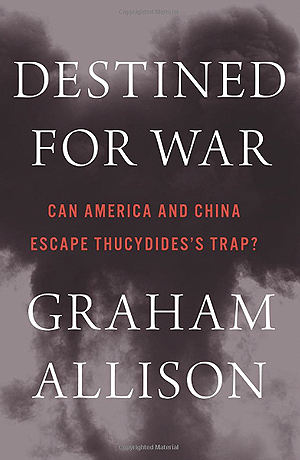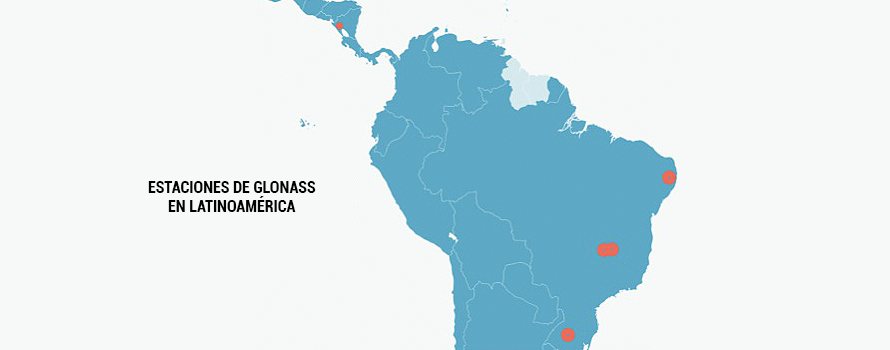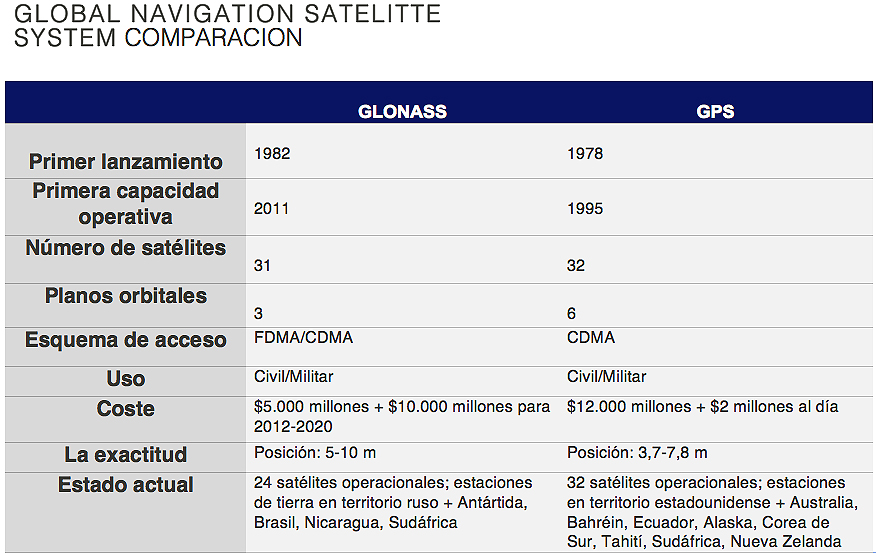Ruta de navegación
Menú de navegación
Blogs
Entries with Categories Global Affairs Security and defence .
[Graham Allison, Destined for War. Can America and China Escape Thucydides's Trap? Houghton Mifflin Harcourt. Boston, 2017. 364 pages]
This is what has been called Thucydides' trap: the dilemma faced by a hegemonic power and a rising power that threatens that hegemony. Is war inevitable? When Thucydides narrated the Peloponnesian War, he wrote about the inevitability for domineering Sparta and the emerging Athens of thinking of armed confrontation as a means of settling conflict.
The fact that these two Greek polises necessarily thought about war, and eventually came to it, does not mean that they had no other options. History has shown that there are: when Wilhelmine Germany threatened to outwhelm Britain's naval strength, the attempt at sorpasso (accompanied by various circumstances) led to World War I, but when Portugal was overtaken by Spain in overseas possessions in the sixteenth century, or when the United States replaced Great Britain as the world's leading power at the end of the nineteenth century, the transfer was peaceful.
The call to Washington and Beijing to do everything possible not to fall into the trap described by the Greek historian is made by Graham Allison in Destined for War. Can America and China Escape Thucydides's Trap? The Dean The founder of Harvard's Kennedy School of Government reviews several historical precedents in his book. The Belfer Center for Science and International Affairs at the same university, where Allison is a member, has researched them director, in a program called Thucydides's Trap.
This concept is defined by Allison as "the strong structural stress caused when an emerging power threatens to unseat a reigning power. In such a status, not only extraordinary or unexpected events, but even ordinary flashpoints in international affairs can trigger large-scale conflicts."
 |
This structural stress is produced by the clash of two profound sensitivities: the emerging power syndrome ("the reinforced sense that an emerging state has of itself, its interests, and its right to recognition and respect"), and its inverse image, the reigning power syndrome ("the established power exhibits a growing sense of fear and insecurity as it faces signs of decline").
Along with the syndromes, both rival powers also experience a security dilemma: "A rising power may disregard the fear and insecurity of a ruling state because it knows that it itself is well-intentioned. Meanwhile, his opponent misinterprets even positive initiatives, taking them as excessively demanding or even threatening."
The use of military force
Allison starts from the fact that China is already catching up with the United States as a power. It has done so in terms of the volume of its Economics (China has already surpassed the U.S. in purchasing power parity) and in relation to some aspects of military strength (a report Rand Corporation predicted that by 2017 China would have "advantage" or "approximate parity" in 6 of the 9 conventional capacity areas. The author's assumption is that China will soon be in a position to wrest the scepter of the greatest superpower from the United States. Arrived before this status, how will both countries react?
In the case of China, its millennial outlook will likely lead to an attitude of patience, as long as there is some small progress in its development. purpose to increase its global specific weight. Since 1949, China has only resorted to force in three of 33 territorial disputes. In those cases, China's leaders waged war – limited wars, conceived as notice to their opponents – even though the enemy was equal or greater, urged by a status of domestic unrest.
For Allison, "as long as events in the South China Sea generally move in China's favor, it seems unlikely that China will use military force. But the trends in the balance of power were to turn against it, particularly at a time of internal political instability, China would initiate a limited military conflict, against an even larger and more powerful state like the United States."
For its part, the United States can choose several strategies, according to Allison: adapt to the new reality, undermine Chinese power (trade war, foment provincial separatism), negotiate a lasting peace, and redefine the relationship. The author does not give a committee firm, but it seems to suggest that Washington should move between the latter two options.
Thus, he recalls how Britain understood that it could not rival the United States in the Western Hemisphere, and how from there a partnership between the two countries, manifested in the First and Second World Wars. That would have to involve accepting that the South China Sea is a area of Chinese influence. And this is not out of mere condescension, but because the United States is proceeding with a real clarification of its vital interests.
Despite its positive tone, Destined for War is one of the essays of the American establishment where the end of the American era and the passing of the baton to China are most openly announced (it does not seem to envision a multipolar or bipolar world, but rather one of primacy of the Asian power). He is also one of the least emphasises – less, of course, than he should – on the strengths that the United States maintains and the problems that could undermine China's coronation.
Russia's GLONASS positioning system has placed ground stations in Brazil and Nicaragua; the Brazilian ones are accessible, but the Nicaraguan one is open to conjecture.
At a time when Russia has declared its interest in having military installations in the Caribbean again, the opening of a Russian station in Managua's area has raised some suspicions. Roscosmos, the Russian space agency, has opened four stations in Brazil, managed with transparency and easy access; in contrast, the one it has built in Nicaragua is shrouded in secrecy. The little that is known about the Nicaraguan station, strangely larger than the others, contrasts with how openly data can be collected about the Brazilian ones.

article / Jakub Hodek [English version].
It is well known that information is power. The more information one has and manages, the more power one enjoys. This approach should be taken when examining the station facilities that support the Russian satellite navigation system and their construction in close proximity to the United States. Of course, we are no longer in the Cold War period, but some traumas of those old days can perhaps help us to better understand the cautious position of the United States and the importance Russia sees in having its facilities in Brazil and especially in Nicaragua.
That historical background of the Cold War is at the origin of the two major navigation systems we use today. The United States launched the Global Positioning System (GPS) project in 1973, and possibly in response, the Soviet Union introduced its own positioning system (GLONASS) three years later. [1] Nearly 45 years have passed, and these two systems are no longer serving as a means for Russians and Americans to try to obtain information about the opposing side, but are collaborating and thus providing a more accurate and faster navigation system for consumers who purchase a smartphone or other electronic device. [2]
However, to achieve global coverage both systems need not only satellites, but also ground stations strategically located around the world. With that purpose, Russian Federal Space Agency Roscosmos has erected stations for the GLONASS system in Russia, Antarctica and South Africa, as well as in the Western Hemisphere: it already has four stations in Brazil and since April 2017 it has one in Nicaragua, which due to the secrecy surrounding its function has caused distrust and suspicion in the United States [3] (USA, for its part, has GPS ground stations in its territory and in Australia, Argentina, United Kingdom, Bahrain, Ecuador, South Korea, Tahiti, South Africa and New Zealand).
The Russian Global Navigation Satellite System(Globalnaya Navigatsionnaya Sputnikovaya Sputnikovaya Sistema or GLONASS) is a positioning system operated by the Russian Aerospace Defense Forces. It consists of 28 satellites, allowing real-time positioning and speed data for surface, sea and airborne objects around the world. [ 4] In principle GLONASS does not transmit any identification information staff; in fact, user devices only receive signals from the satellites, without transmitting anything back. However, it was originally developed with military applications in mind and carries encrypted signals that are supposed to provide higher resolutions to authorized military users (same the US GPS). [5]
In Brazil, there are four ground stations used to track signals from the GLONASS constellation. These stations serve as correction points in the western hemisphere and help to significantly improve the accuracy of navigation signals. Russia is in close and transparent partnership with the Brazilian space agency (AEB), promoting the research and development of the South American country's aerospace sector.
 |
In 2013, the first station was installed, located at campus of the University of Brasilia, which was also the first Russian station of that subject abroad. Another station followed at the same location in 2014, and later, in 2016, a third one was placed at the high school Federal Science Education and Technology of Pernambuco, in Recife. The Russian Federal Space Agency Roscosmos built its fourth Brazilian station on the territory of the Federal University of Santa Maria, in Rio Grande do Sul. In addition to fulfilling its main purpose of increasing the accuracy and improving the performance of GLONASS, the facility can be used by Brazilian scientists to carry out other types of scientific research . [6]
The level of transparency that surrounded the construction and then prevailed in the management of the stations in Brazil is definitely not the same applied to the one opened in Managua, the capital of Nicaragua. There are several pieces of information that sow doubts regarding the real use of the station. To begin with, there is no information on the cost of the facilities or on the specialization of the staff. The fact that it has been placed a short distance from the U.S. Embassy has given rise to conjecture about its use for eavesdropping and espionage.
In addition, vague answers from representatives of Nicaragua and Roscosmos about the use of the station have failed to convey confidence about project. It is a "strategicproject " for both Nicaragua and Russia, concluded Laureano Ortega, the son of the Nicaraguan president. Both countries claim to have a very fluid and close cooperation in many spheres, such as in projects related to health and development, however none of them have materialized with such speed and dedication. [7]
Given Russia's increased military presence in Nicaragua, empowered by the agreement facilitating the docking of Russian warships in Nicaragua announced by Russian Defense Minister Sergei Shoigu during his visit to the Central American country in February 2015, and also concretized in the donation of 50 Russian T-72B1 tanks in 2016 and the increasing movement of the Russian military staff , it can be concluded that Russia clearly sees strategic importance in its presence in Nicaragua. [ 8] [ 9] All this is viewed with suspicion from the U.S. The head of the U.S. Southern Command, Kirt Tidd, warned in April that "the Russians are pursuing an unsettling posture" in Nicaragua, which "impacts the stability of the region."
Undoubtedly, when world powers such as Russia or the United States act outside their territory, they are always guided by a combination of motivations. Strategic moves are essential in the game of world politics. For this very reason, the financial aid that a country receives or the partnership that it can establish with a great power is often subject to political conditionality. In this case, it is difficult to know for sure what exactly is the goal of the station in Nicaragua or even those in Brazil. At first glance, the goal seems neutral-offering higher quality of navigation system and providing a different option to GPS-but given the new value Russia is placing on its geopolitical capabilities, there is the possibility of a more strategic use.
